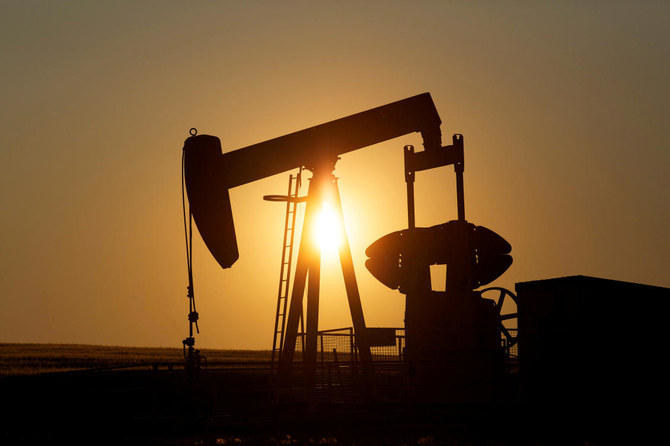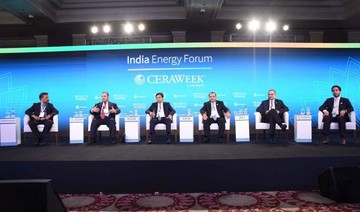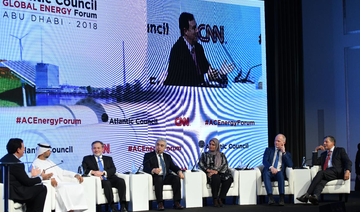LONDON: If China and the US cough, other countries can catch the flu; so significant is the economic ripple effect of these two behemoths.
Trade tariffs and diverging policies toward North Korea are among a growing list of issues that will likely drive discord this year. Energy stakeholders cannot afford to ignore the yo-yo of cooperation and frustration between these two titans.
China is the world’s biggest buyer of oil, surpassing the US in annual gross crude oil imports in 2017 with 8.4m bpd compared to the US’ 7.9m bpd.
Last December, preliminary data from China’s General Administration of Customs showed that China’s crude oil imports rose 15.7% year-on-year to a record high of 10.48m bpd in November.
Plus, the Asian Development Bank expects energy demand to almost double in the Asia and Pacific region by 2030; music to Middle Eastern energy exporters’ ears.
To the west, the boomerang nature of the US’ energy industry suggests more surprises await in the 2020s.
The US has been a net energy importer since 1953, but the continued growth in petroleum and natural gas production means the country will be a net energy exporter by 2020, according to the US’ Energy Information Administration (EIA).
This is an astonishing turnaround, especially considering UN data shows that the country’s population more than doubled from 158 million in 1950 to 324 million in 2017.
Take the LNG market alone: having become a net natural gas exporter on an annual basis in 2017, the US could be the world’s largest exporter by the mid-2020s.
When it comes to economic growth, China takes the crown. Beijing will manage the world’s largest GDP by 2050, while the US’ position on the global scoreboard slips one spot to third place, detailed PwC.
Yes, China is experiencing its lowest growth rate since 1990 and some justifiably anticipate another deceleration post-2020, toward 5% annual growth.
But perspective is vital; President Trump would be delighted if the US steadily posted 5% annual growth. For now, the International Monetary Fund (IMF) expects China’s GDP growth this year to be 6.2% versus the US’ growth of 2.5%.
Simmering tensions between the two will undoubtedly persist. Beijing tends to act without much political fanfare, while President Trump is more vocal but often has less of a bite.
Still, the consensus among Middle Eastern energy stakeholders is that codependence will prevail over strategic mistrust – for now. Making more friends is the Middle East’s best hedging tool. With some strategic quid pro quo, a worst-case scenario can see the region grappling with a cold while isolationists battle the flu.
How can Middle Eastern energy stakeholders plot a safe path through this year’s geopolitical wilderness to remain competitive and have energy security? Ignore isolationists and make more friends. Middle Eastern countries are relatively small; the entire economy of the GCC roughly equates to that of India.
While it’s important to be friends with the US, it’s no longer enough. Alliances with China, India, wider Asia, Europe and the fastest-growing hubs in Africa are also critical.
For example, the Middle East must attract investments from China’s One Belt, One Road initiative (OBOR), as well as India’s Think West policy.
Popular estimates for Chinese investment under the OBOR initiative range from $1 trillion to $8 trillion, according to the Center for Strategic and International Studies. Comparatively, the Marshall Plan after World War II provided the equivalent of $800 billion in reconstruction funds to Europe.
Meanwhile, India’s efforts to integrate itself deeper into geopolitical dimensions, economies and transnational networks are gaining traction.
The country’s $2 trillion economy recently overtook France to become the world’s sixth largest economy, according to Acuité Ratings and Research. PwC expects India’s GDP growth to overtake the US by 2050, securing the number two spot behind China.
Clearly, nurturing friendships in such high places – the world’s fastest growing economies and biggest energy consumers – can support the Middle East’s coffers while minimizing the bruises caused by the sharp elbows of geopolitics.
Saudi Arabia-based Apicorp said the Middle East and North Africa (MENA) must invest $260 billion in its power sector alone to meet rising electricity demand in 2018-2022. This is just one example of where friends with deep pockets and a reliance on imports can help the Middle East scale its cliff of energy demand.
Saudi Energy Forum 2019: How Middle East stakeholders can remain competitive, secure
Saudi Energy Forum 2019: How Middle East stakeholders can remain competitive, secure

ILF Saudi Arabia: Improving quality of life in Kingdom for over 40 years

It has been more than four decades since ILF Consulting Engineers first set foot on Arab soil. Originally known as Ingenieurgemeinschaft Lässer-Feizlmayr, ILF was a modest sized company when it was first commissioned by the Saline Water Conversion Corporation to engineer a revolutionary pipeline system.
This system, stretching 467 km from Jubail on the Arabian Gulf to Riyadh, heralded the world’s inaugural closed high-pressure pipeline system for water transportation. With the start of this pioneering project, the journey of ILF in the Gulf region began.
Since then, ILF has continued to expand its presence in Saudi Arabia, winning contracts for some of the region’s largest and most ground-breaking water transfer projects with a total length of close to 15,000 km.
Today, in the face of climatic challenges, the creation of sustainable infrastructure and utilities is one of the country’s most important tasks.
Building on its impressive history in the provision of excellent engineering services in the Kingdom for many decades as well as its global expertise in the fields of energy and climate protection, water and environment, transportation and urban spaces as well as resources and sustainable industry, ILF is able to provide both engineering and advisory services to help meet current and future challenges for today’s society and future generations.
The introduction of Saudi Vision 2030 serves as a strategic framework aimed at diversifying the country’s economy and reducing its dependency on oil revenue. The core objectives encompass economic diversification, privatization, promotion of investment, enhancement of education, social and cultural development, and governance reform, and include significant public and private investments in sustainable infrastructure and utilities.
In alignment with Vision 2030, and through its commitment to its core values of improving the quality of life through the provision of excellent engineering and advisory services, ILF Saudi Arabia not only supports the Saudization, localization and regional headquarters initiatives but also provides its services to a wide range of public and private clients for projects in the following fields:
• Water and environment (water treatment, sewage treatment, industrial waste water treatment, water transmission, water storage, water distribution, water reuse, urban irrigation, irrigation, greening initiatives, parks and natural reserves.)
• Energy and climate protection (renewable power generation — solar, wind and geothermal, battery energy systems, energy storage — pumped storage, power transmission and distribution)
• Transportation and urban development (urban infrastructure)
• Resources and sustainable industry (mining infrastructure, carbon capture)
ILF’s commitment to sustainability is reflected not only in the company’s project portfolio, where they support their clients in their efforts to achieve sustainable development through a wide range of projects, but also in the local training program the company has been running for over 10 years, something ILF regards as a sustainable contribution to society. ILF is also a member of the global movement of companies that measure and disclose their environmental, social, economic and governance impacts in accordance with international reporting standards, helping them to evolve in a sustainable way.
“At ILF Consulting Engineers in Saudi Arabia, we take great pride in our contributions to current and future projects. Our commitment to improving the quality of life permeates our daily endeavors and drives our continued growth in both staff and project scope,” the company said in a statement.
A ‘floating resort’: Bookings open for Saudi Arabia’s first cruise line ‘AROYA Cruises’

Cruise Saudi, a 100 percent Public Investment Fund owned business, responsible for the creation and development of the cruise industry in the Kingdom, has announced the commercial launch of its owned cruise line, AROYA Cruises, with trips now available to purchase via its website.
As the first Arabian cruise line, AROYA Cruises is leading the way offering remarkably Arabian experiences for guests at sea and onshore. Pioneering in its design, AROYA Cruises reflects Arabian generosity and Saudi Arabia’s famous “hafawa” (hospitality), providing a unique experience with passenger comfort at its heart.
With the ability to accommodate 3,362 passengers, AROYA Cruises is a floating resort, 335 meters in length, with 1,678 cabins, including stunning balcony and sea view cabins, suites, and villas. The entertainment concept has been curated to offer activities for all passenger groups. The ship has 20 entertainment venues across 18 decks that will allow passengers to indulge in an array of experiences, including shopping in the Souq AROYA retail area, and enjoy performances in the 1,018-seater AROYA Theater, which will captivate guests with headline entertainment, movies, and dedicated shows for children. Families can connect in the Atrium Area, which will host “Gathering Hubs” and “Variety Acts,” and enjoy the 1,858-square-meter “kids zone,” with a splash area equipped with water slides.
For those looking to relax and unwind whilst onboard, the “Blossom by AROYA” spa will have all passenger wellness needs covered. With a focus on immersion of the five senses — sound, sight, taste, aroma and touch — the facilities include a thermal suite, snow room, relaxation room, and treatment room, as well as a beauty clinic, beauty salon, men’s barbers and gym.
With five complimentary restaurants, 11 specialty restaurants, and 12 cafés and lounges, Aroya offers a wide variety of F&B options from across the globe, spanning Lebanese, Italian and Asian. Amongst these dining outlets is IRTH, the first Saudi restaurant at sea, featuring traditional Arabian dining.
Dr. Joerg Rudolph, president of AROYA Cruises, said: “The launch of our cruise line to commercial markets is an important milestone for both AROYA Cruises, and for the tourism landscape in Saudi. We are thrilled that the public can now book sailings with us as we strive to reinvent the meaning of holidays in Arabia. We have been steadfast in our mission to create a ‘Remarkably Arabian’ cruise line offering for guests at sea and onshore, commercially and sustainably, and we look forward to sharing this with our passengers.”
For an elevated offering, the AROYA VIP package provides exclusive designated areas for a premium experience. With spacious and unique accommodation, outdoor lounges and exceptional dining, the AROYA exclusive experience provides the very best amenities and services for guests.
With inaugural sailings scheduled in the Red Sea for December 2024, itineraries will include time at the Cruise Saudi-owned private island, as well as visits to major destinations along the Red Sea, including Egypt and Jordan.
Cabins fares start from SR558 ($150) per person, per night.
Red Sea Global to bring Oracle hotel tech to KSA

Red Sea Global, the developer behind regenerative tourism destinations The Red Sea and Amaala, has teamed up with global tech giant Oracle to introduce its hospitality technology solutions, including the Oracle Hospitality OPERA Cloud Central platform, in the Kingdom for the first time.
RSG’s premier luxury resorts — Thuwal Private Retreat, Shebara and Desert Rock — are set to become the first resorts in the Kingdom to leverage Oracle’s cutting-edge cloud hospitality technology solutions. This follows the company’s decision to invest in bringing these solutions to Saudi Arabia via its Oracle Cloud in Jeddah.
“The Oracle Hospitality OPERA Cloud Central platform truly is best-in-class, but until now, it was not accessible to the industry in Saudi Arabia. Oracle was eager to be part of the exciting transformation happening in the Kingdom, especially within the hospitality industry. With their expertise and support, we now have the technology in place to deliver exceptional guest experiences, responding to the needs of our discerning visitors before they themselves know what they want,” said John Pagano, group CEO at Red Sea Global.
Previously hosted outside of Saudi Arabia, the Oracle Hospitality OPERA Cloud Central platform was inaccessible to customers due to data residency rules. By investing in bringing these solutions to the Kingdom, for the first time the entire Saudi hospitality industry can benefit from its technological services.
Alex Alt, executive vice president and general manager, Oracle Hospitality, said: “Saudi Arabia is one of the most exciting hospitality market stories in the world today, and by pioneering a regenerative approach to tourism, Red Sea Global is at the heart of that transformation. Now, Oracle will be a part of shaping the future of the sector in the region as well, which is why we are investing heavily in bringing our solutions to the Kingdom. Through OPERA Cloud, RSG now has a scalable hospitality platform that empowers its guest services staff to provide faster, hassle-free, personalized experiences.”
The Oracle Hospitality OPERA Cloud Central platform unites data and functionality under a common user interface and experience. With it, customers can get a comprehensive view of their hotel business, including distribution, sales, service interactions, loyalty programs, and more to help make faster decisions that can benefit staff and guests. The all-in-one platform helps hotels remove silos and friction across various functional areas both on as well as above property. Single image rates and inventory, as well as reservations, groups, and profiles, combined with a unified end user experience, makes information accessible to all key stakeholders at all customer touch points.
Last year, The Red Sea destination welcomed its first guests, and the Red Sea International Airport has been receiving a regular schedule of domestic flights since September 2023 — international flights also began last month. Three of the destination’s hotels are now open, with two additional resorts on track to open later this year.
Thuwal Private Retreat will also open this year, while AMAALA remains on track to welcome first guests to Triple Bay in 2025.
Saudi Awwal Bank opens new branch in SAB Tower

Saudi Awwal Bank, one of the leading banks in the Kingdom, inaugurated its newest integrated branch in the SAB Tower. The inauguration was held in the presence of Lubna Olayan, chairman of the board of directors, and members of the board and the executive management.
This new integrated branch signifies SAB’s strategy in enhancing customer experience in the Kingdom and reiterates its commitment to providing distinguished banking services for its retail customers, and small and medium enterprises, in addition to investment services.
Bandar Al-Gheshayan, chief wealth and personal banking officer at SAB, said: “We are pleased to open our new branch, which comes in line with our commitment to serving our customers with unparalleled dedication and excellence.”
He added: “This is part of our vision to become the bank of choice that offers innovative financial solutions, and our ongoing efforts to continue building strong and sustainable relationships with our customers and partners.”
The bank continues to enhance its efforts toward developing retail and corporate banking services, aiming to provide a comprehensive range of financial and banking solutions that meet the diverse needs of its clients. Last year, SAB inaugurated its new headquarters — the SAB Tower, which has been awarded the SmartScore Platinum and LEED Gold certifications.
SAB is one of the largest banks in the Kingdom and traces its origins in Saudi Arabia to more than 90 years, during which time it has been an active partner supporting the Kingdom’s economic growth and social development.
SAB offers integrated financial and banking services, including corporate banking, investment, private banking, and treasury.
The bank’s paid-up capital is SR20.5 billion, after the legal merger with Alawwal Bank on March 14, 2021, when it was legally known as the Saudi British Bank. SAB operates under the supervision of the Saudi Central Bank, and is a partner of the HSBC Group.
Cognite Data Fusion Now Available on Google Cloud in Saudi Arabia

RIYADH: Cognite, a leader in industrial software, announced that its flagship Industrial DataOps product, Cognite Data Fusion, designed to enable customers to seamlessly migrate their data, is now available on Google Cloud in Saudi Arabia.
Collaborating with Google Cloud, Cognite is using artificial intelligence and data analytics to help industrial companies like energy, manufacturing, and logistics industries while providing them with valuable insights, increase efficiency, and drive digital transformation.
Francois Laborie, Executive Vice President, Cognite, said in a press release : "This is a significant milestone in our partnership, and as well as our commitment to the Kingdom. The power of data and AI, from Cognite and Google Cloud, enables industry transformation via solutions that deliver business value to our customers."
Abdul Rahman Al Thehaiban, Managing Director, Middle East, Turkey and Africa, Google Cloud said: By leveraging Google Cloud's scalable and secure infrastructure, Cognite Data Fusion will enable customers to harness the power of their data to make smarter business decisions and accelerate their digital transformation journey."
Cognite Data Fusion is brought to the market by CNTXT, a joint venture between Saudi Aramco and Cognite. Abdullah Jarwan, CEO of CNTXT said "Cognite Data Fusion is poised to revolutionize how the Kingdom’s industries harness insights from their data. Cognite Data Fusion offers world-leading gen AI capabilities tailored for industrial sectors."












